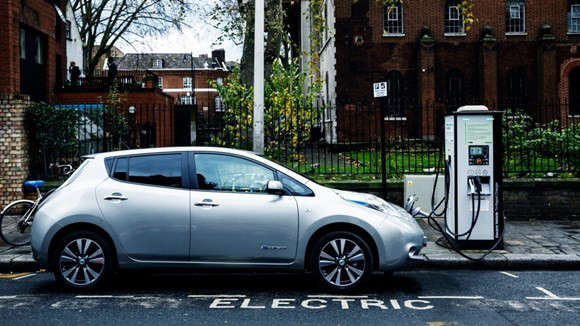-
 play_arrow
play_arrow
Erewash Sound Love Music - Love Erewash
-
 play_arrow
play_arrow
Living with Functional Neurological Disorder for 10 years - Liam Virgo Erewash Sound
Discount of up to £3,750 on electric cars set to slash costs for thousands
today14 July 2025 4

Drivers across the UK will soon enjoy discounts on dozens of new electric car models after the Transport Secretary announced a £650 million grant scheme worth up to £3,750 per car, putting more money back in working people’s pockets as part of the Plan for Change and making owning an electric car a reality for thousands.
Supporting the manifesto commitment to phase out the sale of new petrol and diesel cars by 2030, the £650 million Electric Car Grant (ECG) will back UK and other manufacturers, with eligibility dependent on the highest manufacturing sustainability standards. Discounts up to £3,750 will be available at the point of sale for new eligible electric cars priced at or under £37,000.
Drivers will start to benefit from discounts as soon as manufacturers successfully apply for their zero emission cars to be part of the grant scheme from 16th July, with funding available until the 2028/29 financial year.
With drivers citing upfront costs as a key barrier to adoption, the grant will narrow the upfront cost between petrol and electric vehicles, giving thousands more drivers access to savings of up to £1,500 a year in fuel and running costs compared to a petrol car. The discount means that zero emission cars are now cheaper to buy and run than ever before, and comes on top of preferential tax rates, delivering real savings for working families.
Owning and buying an electric vehicle (EV) is becoming cheaper, with two in five of used electric cars sold at under £20,000 and 34 brand new electric cars available from under £30,000.
Standing firmly on the side of British drivers, this latest investment is part of the Government’s major plan to support motorists, including a record £1.6 billion invested to tackle potholes and freezing the fuel duty at 5p until spring 2026, saving the average motorist £50–£60 over the year.
Transport Secretary Heidi Alexander said: "This EV grant will not only allow people to keep more of their hard-earned money – it’ll help our automotive sector seize one of the biggest opportunities of the 21st century, and with over 82,000 public chargepoints now available across the UK, we've built the infrastructure families need to make the switch with confidence.
"This is our Plan for Change in action. We're backing British drivers, British jobs and British growth."
This latest scheme builds on the Government's major £63 million package to support at home charging for households without driveways, transition NHS fleets to electric, and create thousands of chargepoints at business depots across the country.
In total the Government is investing £4.5 billion to turbocharge the switch to EVs, securing Britain’s position as a world-leader in electric vehicle adoption while helping put more money in people’s pockets.
The UK is already a global leader in the transition to zero emissions driving, with the largest EV market in Europe in 2024 and sales up a fifth on the previous year.
The latest update also comes as the UK hits over 82,000 public chargepoints nationwide – with one added every 30 minutes – giving peace of mind to drivers that they will be able to charge conveniently at home, work or on longer journeys.
This latest move comes alongside the Zero Emission Vehicle (ZEV) Mandate, which requires manufacturers to sell increasing percentages of zero emission vehicles each year. Recent changes to the mandate give industry the certainty, stability, and support they’ve been asking for, alongside crucial trade deals with the US, India and the European Union following the recent global economic headwinds.
RAC head of policy Simon Williams said: “Within weeks, discounted cars should start appearing at dealerships across the country. And, as the biggest savings will be given to cars with the strongest ‘green’ manufacturing credentials, drivers will be picking models that are not only better for their wallets, but better for the planet too.
“This is further welcome news following last week’s announcement about more funding for pavement gully charging solutions that will enable those without driveways to charge an EV at home. Together, these initiatives should mean more drivers than ever start benefitting from the lower costs of running an electric car."
Vicky Read, CEO of ChargeUK said: “This announcement is brilliant news – for drivers and for the UK’s transition to electric vehicles. With a commitment to invest £6bn through to 2030, the UK’s charging industry has rolled out infrastructure ahead of demand to ensure that when drivers switch the network is there to make charging as convenient as possible. There are now 82,000 public charge points and a new one goes in the ground every 29 minutes on average.
“Hot on the heels of the weekend’s announcement on measures to support charging, including meeting ChargeUK’s calls for improvements to signage on main roads, todays package is another vital boost to the charging industry, helping it invest with confidence.”
Dan Caesar, CEO, Electric Vehicles UK said: “A targeted incentive program is a significant step forward in encouraging consumers to buy battery electric vehicles, and to make them more accessible. While battery-only EVs are much cheaper to buy and run than most realise, surveys show that cost misperceptions are the primary reason for hesitance.”
“A generous grant, of this nature, gives a new group of interested buyers, that might have thought that going electric was beyond them, a gentle nudge into what is great tech. More than 9 out of 10 battery EV drivers will never revert, and there’s a reason for that.”
John Lewis, CEO, char.gy, said: “It’s encouraging to see the Government stepping up to support consumers in making the switch to electric vehicles. This move brings us closer to a future where driving electric is accessible to everyone – not just the privileged few.
“Combined with the introduction of the price cap and the additional funding for on-street charge points, we can get more affordable cars on the road and more people enjoying the benefits of EVs. The outcome will be cleaner air for all and more cash in the consumer’s wallet as they enjoy the long-term savings of driving electric.”
Written by: Erewash Sound
Similar posts
Sponsors
ON AIR
SEARCH
CATEGORIES
RECENT POSTS

‘Sticking plaster’ support plan for pubs neglects other sectors says Chamber

Are you a member of the Ockbrook School Alumni?

Derby adult club saved from closure after crunch meeting

Derbyshire County Council drops core net zero commitment, shifting towards economic benefits and production

Erewash Sound and The Crockers DJs present ‘Decades of Dance’ – Saturday 4th April
103.5 & 96.8 FM
LOVE MUSIC
LOVE EREWASH
Office: 0115 888 0968
Studio: 0115 930 3450
Erewash Sound, The Media Centre, 37 Vernon Street, Ilkeston, DE7 8PD
© Copyright 2026 Erewash Sound CIC. All Rights Reserved. Company Number 6658171.






